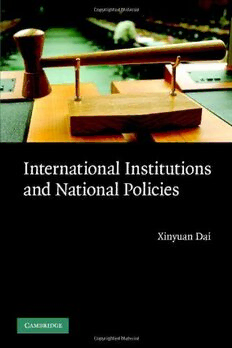
International Institutions and National Policies PDF
199 Pages·2007·1.048 MB·English
Most books are stored in the elastic cloud where traffic is expensive. For this reason, we have a limit on daily download.
Preview International Institutions and National Policies
Description:
The proliferation of international institutions and their impact has become a central issue in international relations. Why do countries comply with international agreements and how do international institutions influence national policies? Most theories focus on the extent to which international institutions can wield 'carrots and sticks' directly in their relations with states. Xinyuan Dai presents an alternative framework in which they influence national policies indirectly by utilizing non-state actors (NGOs, social movements) and empowering domestic constituencies. In this way, even weak international institutions that lack 'carrots and sticks' may have powerful effects on states. Supported by empirical studies of environmental politics, human rights and economic and security issues, this book sheds fresh light on how and why international institutions matter. It will be of interest to students, scholars and policymakers in both international relations and international law.
See more
The list of books you might like
Most books are stored in the elastic cloud where traffic is expensive. For this reason, we have a limit on daily download.
